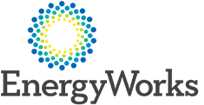 By now I’m sure you’ve heard that the caps on PECO’s electricity rates expired on January 1st, and although I haven’t received my first electric bill of the new year yet, I know it’s going to be a bitter pill to swallow. Fortunately, we now have EnergyWorks in the City of Brotherly Love. EnergyWorks is a region-wide energy efficiency program that is funded by the energy efficiency block grant that Philadelphia received through the Recovery Act last spring. It’s your tax dollars at work, really. By signing up for the program, Philadelphians get a professional energy analysis of their house, energy efficiency recommendations, installation services and access to low-interest loans to pay for energy-efficient upgrades.
By now I’m sure you’ve heard that the caps on PECO’s electricity rates expired on January 1st, and although I haven’t received my first electric bill of the new year yet, I know it’s going to be a bitter pill to swallow. Fortunately, we now have EnergyWorks in the City of Brotherly Love. EnergyWorks is a region-wide energy efficiency program that is funded by the energy efficiency block grant that Philadelphia received through the Recovery Act last spring. It’s your tax dollars at work, really. By signing up for the program, Philadelphians get a professional energy analysis of their house, energy efficiency recommendations, installation services and access to low-interest loans to pay for energy-efficient upgrades.
It sounded pretty good to me, and since I’m always preaching the virtues of energy efficiency in my monthly Grid column, I figured the time was right for me to put my money where my mouth is. So I signed up for the program, and I’ll be blogging regularly about the process of using EnergyWorks to make my house more energy-efficient. I may even have a few contests along the way to reward faithful Griddle readers. My hope is that a few of you might be inspired to sign up for the program yourself.
So let’s get started.
On January 10th, I went to the EnergyWorks website, which directed me to fill out an intake form on the Energy Coordinating Agency’s (ECA) website. The home energy audit is performed through the ECA, and they’re the ones that help you find certified contractors to perform the recommended work. In the end, if you spend at least $1,000 on energy efficiency upgrades (which isn’t difficult), you get a rebate of $300.
It took about 10 minutes to fill out the form, and they asked general data-gathering questions about things like the size of the house, type of house, age of the house, what kind of heating fuel I use, whether I have central air, my usual thermostat temperature, whether I have utility bill data available, how long I plan to live here, and what kinds of improvements I’m considering. It might take a little longer to fill out the form if you have to look up the answers to those questions.
Two days later, I received an e-mail from the ECA saying that based on the information I provided, my energy audit would cost $400. This fee includes a blower door test; general inspection of health, safety, and durability issues; an insulation value check; and combustion appliance testing in one combustion appliance zone (CAZ).
You have to pay the fee up front, either through PayPal or by check. $400 may seem like a lot, but remember: if you spend at least $1000 on energy efficiency upgrades (for which you can get low interest loans), you get a $300 rebate, so in the end, your energy audit will only have cost $100. That’s a pretty good deal. I just paid today, and now that I’m paid up, another person from ECA will pair me with a building analyst to set up an appointment.
I can’t wait! Stay tuned for more…







